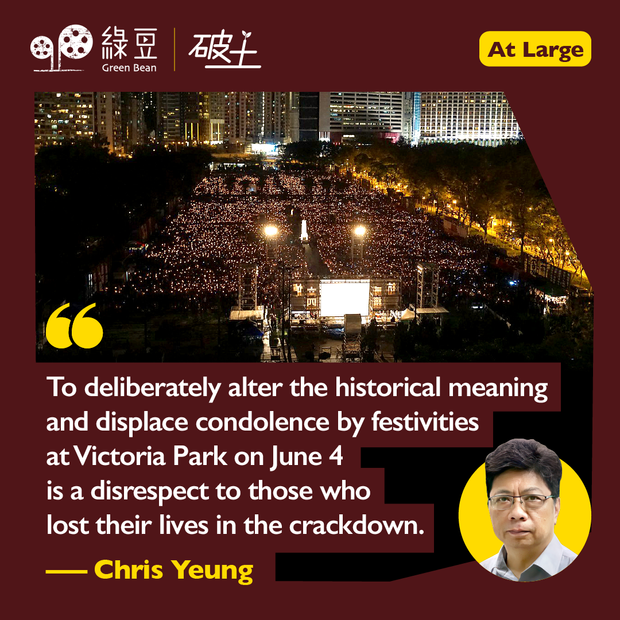The June 4 vigil sight turns ugly

This year marks the 35th anniversary of the crackdown of pro-democracy protesters and civilians at and around Tiananmen Square in Beijing on June 4, 1989. Around this time every year since then, Hong Kong media would have started running stories about June 4, culminating with the annual candlelight vigil at Victoria Park on June 4.
For more than three decades since the 1989 bloodbath, Hong Kong people had converged at the six football fields and adjacent open space in the park to mourn the death of the June 4 victims. They lit candles as a symbol of hope for a democratic and free China.
The sea of candle lights had intriguingly emerged as a strong rebuttal to critics, who said Hong Kong is no longer a free society.
The beautiful sight vanished
The candlelight vigil, described as “beautiful sight” by the then US House Speaker Nancy Pelosi at a Congressional hearing on June 4, 2019, had become history. First it was Covid pandemic in 2020, then came the national security law that took effect on July 1, 2020. The “beautiful sight” that Pelosi had coined has vanished.
The Hong Kong Alliance in Support of Patriotic Democratic Movement in China, which organised the June 4 commemoration, was disbanded. Its core leaders are facing subversion charges.
On June 4 last year, it was a vastly different mood at Victoria Park when the football fields were rented out by the Government to the Federation of Guangdong Community Organisation and more than 26 provincial natives associations for a three-day carnival that straddled June 4.
It featured food and drinks from different provinces, patriotic songs and traditional Chinese dances.
Just as the candlelight vigil had become a symbol of “one country, two systems”, the June 4 carnival has given a glimpse of the new Hong Kong under “one country, two systems 2.0”.
The Hong Kong way of loving China through peaceful assembly, political slogans and inspirational songs and silent tribute is no longer viable. Taking the stage at the Victoria Park are a list of fraternity associations in Hong Kong with strong identity with the motherland.
It can hardly be coincidental that they have picked June 4 as their first gathering of its kind at Victoria Park last year.
It was a clear attempt to change the historic meaning of June 4 from a day of mourning – and protest against the communist regime – to a day of white-washing the June 4 bloodstain and embracing the communist-led nation.
Disrespect
Emboldened by what they deemed as a success, the organisers told an online platform, The Collective HK, they plan to hold a carnival again around June 4 this year. Johnny Ng, a Legislative Council Election Committee constituency member and a vice-chairman of the Guangdong association, said there was no special consideration about the choice of dates.
That cannot be a more disingenuous statement that insults the wisdom of Hongkongers. Worse still, it rubs more salt to the wounds in the hearts of people inflicted by the military crackdown in Beijing.
June 4 has been the most politically sensitive day in Hong Kong, both before and after 1997, for obvious reasons.
It is an open secret that former chief executive Tung Chee-hwa had tried to persuade the Hong Kong Alliance led by late pro-democracy leader Szeto Wah to cancel the annual vigil following the sovereignty changeover and new constitutional framework.
Despite the enduring political pressure, the candlelight commemoration had survived, which spoke volumes of the room for freedom of expression in the city, at least when it comes to June 4.
The vanished candlelight vigil is not just a loss of a “beautiful sight”, but free expression of a feeling of sadness and remembrance for the dead and hope for a better tomorrow publicly.
To deliberately alter the historical meaning and displace condolence by festivities at Victoria Park on June 4 is a disrespect to those who lost their lives in the crackdown.
June 4 is a sad day for those who have not forgotten the day. It is more sad when the June 4 candlelight vigil is no longer possible to be held. They will run out of words to tell their sadness and anger if the site for remembrance becomes a place for fun.
( Photo : Wikipedia user Prosperity Horizons (CC BY-SA 4.0 license) )
▌[At Large] About the Author
Chris Yeung is a veteran journalist, a founder and chief writer of the now-disbanded CitizenNews; he now runs a daily news commentary channel on Youtube. He had formerly worked with the South China Morning Post and the Hong Kong Economic Journal.